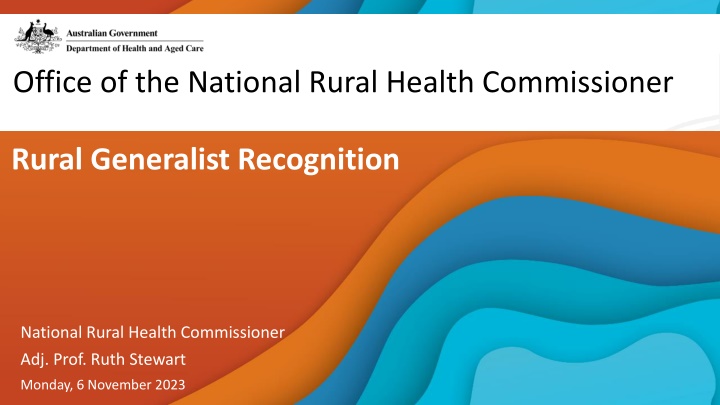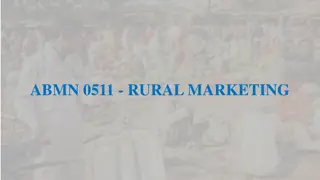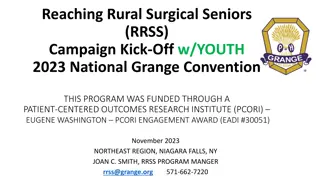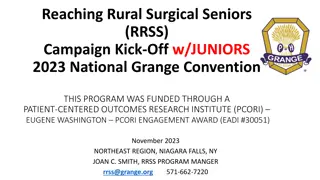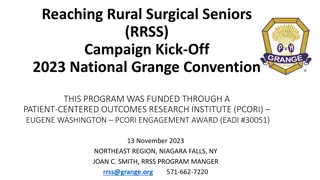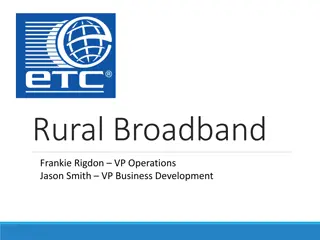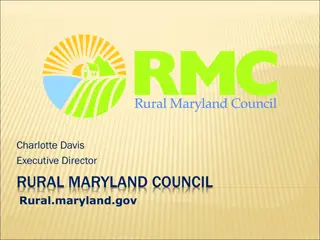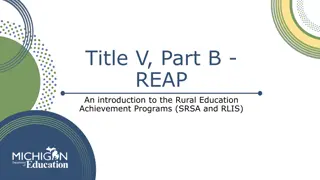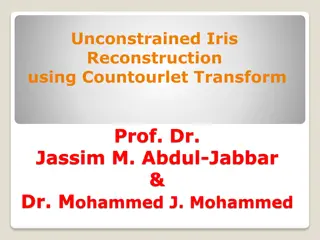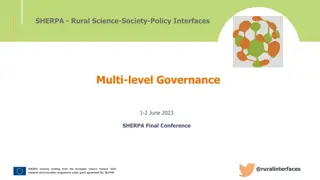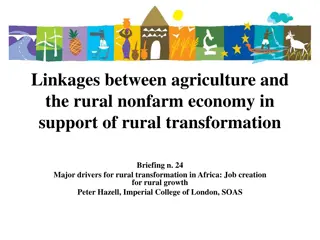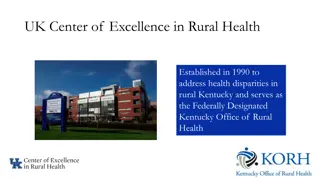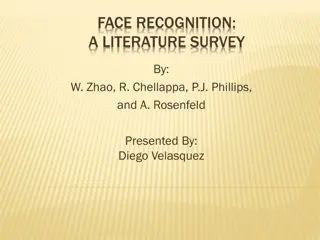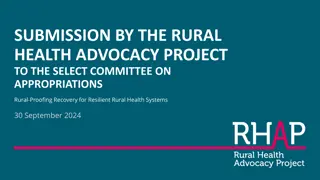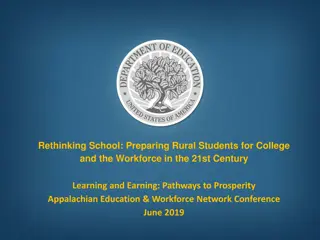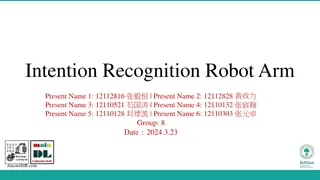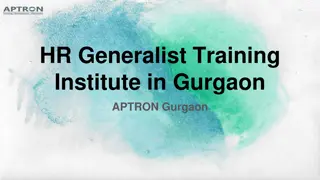Enhancing Rural Healthcare through Rural Generalist Recognition
Rural Generalist Recognition acknowledges the vital role of medical practitioners trained to address diverse healthcare needs in Australian rural communities. The program ensures quality care, professional excellence, workforce planning, and offers an aspirational career path for future doctors while enhancing rural healthcare services.
Download Presentation

Please find below an Image/Link to download the presentation.
The content on the website is provided AS IS for your information and personal use only. It may not be sold, licensed, or shared on other websites without obtaining consent from the author.If you encounter any issues during the download, it is possible that the publisher has removed the file from their server.
You are allowed to download the files provided on this website for personal or commercial use, subject to the condition that they are used lawfully. All files are the property of their respective owners.
The content on the website is provided AS IS for your information and personal use only. It may not be sold, licensed, or shared on other websites without obtaining consent from the author.
E N D
Presentation Transcript
Office of the National Rural Health Commissioner Rural Generalist Recognition National Rural Health Commissioner Adj. Prof. Ruth Stewart Monday, 6 November 2023
Acknowledgment of Country I acknowledge the Traditional Custodians of the land, the Mandandanji people, on which I am meeting you from today. I pay my respects to the Elders of this land and waterways, ancestors who have come before us and those who are with us and guide us today. I would also like to acknowledge emerging leaders within our communities. I extend my respect to all Aboriginal and Torres Strait Islander people here today.
Rural Generalist Recognition Taskforce Members: Adjunct Professor Ruth Stewart, NRHC Dr Michael Clements, Chair, RACGP Rural Marita Cowie, CEO ACRRM Andrew Hayward, National Rural Manager, RACGP Dr Ewen McPhee, ACRRM Dr Ken Wanguhu, RACGP Rural Censor Paul Wappett, CEO RACGP Mary Jane Streeton, Project Officer, RG Recognition
What is a Rural Generalist? A medical practitioner who is trained to meet the specific current and future healthcare needs of Australian rural and remote communities, in cost-effective way, by providing both comprehensive general practice and emergency care and required components of other medical specialty care in a hospital land community settings as part of a rural healthcare team. The Collingrove Agreement
What is RG specialist field and protected title
Rural Generalist Specialist field Rural generalist medicine, Specialist RG Source: MBA, June 2018 https://www.medicalboard.gov.au/Registration-Standards.aspx
Benefits of RG Recognition
Why is Rural Generalist Recognition needed? Quality-assured care Professional excellence Named job Workforce planning Rural care assured against training standard that reflects job Recognition of extra years of training and extra clinical responsibilities Aspirational career for doctors of future Rural services planning build-in RG options Rural patients know their doctors skillset Rural care assured against a common, national training standard RG workforce training and support RG profession inspires, trains, and mentors, new generation Rural communities and health services advertise for doctor with RG skillset RG job portability across States/Territories Processing doctors qualifications to practice in hospitals simplified (credentialing) RG profession shares learning and focusses research toward best practice
The process of RG Recognition
Stage 1 Initial Assessment Initial proposal - Dec 2019 MBA Advice Aug 2020 Additional information (incl. consultation) July 2021 Approval to proceed to Stage 2 Nov 2021 Application to OBPR Feb 2022 Approval to proceed w/o RIS May 2022 Source: AMC Flowchart, Sept 2018, MBA website, https://www.medicalboard.gov.au/registration/recognition-of-medical-specialties.aspx
Stage 2 Detailed Assessment Stage 2 application Dec 2022 AMC Assessment Panel formed late 2022 Application reviewed/consultation drafted - July 2023 Consultation Paper MBA endorsed Aug 2023 National Consultation - Oct-Dec 2023 AMC Assessment Panel reviews feedback and drafts report (may involve additional steps - stakeholder discussions, expert advice) AMC Assessment Panel advice
Final Steps.... AMC RoMSAC review and advice AMC SEAC review and advice MBA review and advice HMM decision (specialist title and specialist field created on register) AMC accreditation of RG programs
How do I put in a submission?
Consultation Questions 1. 2. 3. 4. 5. 6. 7. 8. Has need been substantiated? Positive consequences Negative consequences Key issues for focus Negative patient impacts First nations peoples impacts Key stakeholders for further consultation Impacts with other GPs and other medical specialties Impacts for rural general practice, unnecessary deskilling Economic impacts for govt, business, consumers 9. 10.
@RuralHC_Aus @DrFayeMcMillan @NowlanShelley Thank you
Why do we need Rural Generalists? Rural access to specialised services Integrated rural care Rural access to emergency care RG attracts doctors to rural careers Rural patients can receive coordinated care from community/ACCHS clinic to hospital and back Most rural hospitals do not have any specialist emergency physicians 25% fewer specialist services received by people in rural areas, than people in cities RG is an attractive rural career option RGs: 60% fewer specialist services received by people in remote areas, than people in cities RG is career with high rural retention RGs have the range of skills to pivot to fill local service gaps Provide rural emergency care inc. obstetrics, anaesthetics and retrievals Without local RGs, rural families bear costs of accessing urban care Appeal of jack-of-all-trades medicine RGs diverse skills can make other local health services viable Manage rural hospital emergency depts Local care is most needed by the most disadvantaged people (older, low-income, chronically ill, disabilities) Offers viable career option for doctors wanting to go rural but interested in specialist care All RGs trained for GP and generalist care Support local emergency rosters RGs enable care on-country
Case for change services GP and Non-GP specialist MBS expenditure by geographic classification 2020-21 access Rural expenditure gap: $6.55b p/a, $850p/c (NRHA, 2023) GP specialist services Non-GP specialist services GP services p/c compared to major cities: - 9% lower (OR) - 36% lower (R/VR) Services per 100 people MBS funding per 100 people Services per 100 people MBS funding per 100 people Non-GP services p/c compared to major cities: - 25% lower (OR) - 59% lower (R/VR) National 666 $34,064 102 $9,135 Major Cities 675 $34,349 106 $9,507 Inner Regional 675 $34,916 104 $9,061 Outer Regional 613 $31,730 80 $7,000 Remote/ Very Remote 431 $24,619 44 $3,889 Source: AIHW. (2021). Medicare-subsidised GP, allied health and specialist health care across local areas: 2019 20 to 2020 21.
Early steps Application for RRM as a medical specialty 2005 Draft National Framework for RGM 2011 Commitment to NRGP, National Rural Health Commissioner 2014 NRGP Taskforce National Consultation 2017 NRGP Recommendations 2018 RG Summit , Cairns 2017
